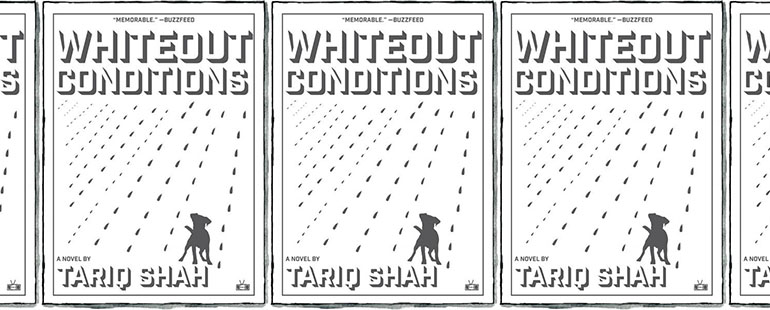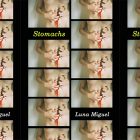Whiteout Conditions by Tariq Shah

Whiteout Conditions
Tariq Shah
Two Dollar Radio | March 17, 2020
Whiteout Conditions, Tariq Shah’s slim but powerful debut novel, focuses on grief, loss, and friendship in lyrical and stunning prose. After being away for several years, Antioch—known as Ant—returns home to the Midwest, for the funeral of Ray, a childhood friend. Ray, the younger cousin of Ant’s friend Vince who often tagged along with the two older boys, was mauled to death by a local dog. Vince picks up Ant at the airport and together they drive north to the funeral in unpredictable March weather.
From the opening, Ant sees himself as alone and displaced in the world, his dark humor covering his hurt: “With the last of my loved ones now gone, I find funerals kind of fun,” he says. As Ant and Vince travel to the funeral and back, Shah carefully unpacks each of the ways that those whom Ant has loved—grandparents, parents, girlfriend—are no longer with him. His mother died from cancer, his father disappeared from his life, and his girlfriend left him and was then killed. Ant has as a result shut himself off from his childhood—and, indeed, from much of the world—but it takes Ray’s death—so horrific that it made the national news—to bring him back, pulling him into his past.
The novel, written in first person and present tense, is deeply embedded in Ant’s interiority, spiraling from the present moment to memory to thought, granting the reader deeper and deeper knowledge of Ant as the book progresses. But because Ant’s grief has isolated him from the world, we learn more about him through his memories than we do from his thoughts or actions. The present moment of the book is short but always moving forward—it takes place over twenty-four hours, a tight container that not only allows for the journey to the funeral and back but also provides room for Ant’s interiority.
Vince and Ant quickly fall back into their old patterns, bantering on the road trip. The two behave like always-fighting brothers, a hum of anger under their love. Toxic masculinity defines their relationship: two men, reverting to child-like ways, unable to express how they truly feel. They dance like boxers around important subjects, their speech serving as punches, back and forth, back and forth. The dialogue is often not tagged, further emphasizing its combativeness. Here, Vince begins the conversation:
‘You know what you smell like?’
‘Does this tape deck do anything other than mangle tapes? You got an aux cord or something in back? I can plug in the Discman.’
‘You smell like death, Ant. You’ve got it all over you.’
‘Why don’t you just drive and keep your eyes on the road?’
‘Dee-ee-ay-tee-aych. You stink of it.’
The dialogue illuminates the distance between what is said and what is thought. Having not seen each other for five years, Ant throws his bag into the trunk of the car and tells Vince he needs a haircut. When Vince asks him how he’s been, Ant doesn’t really respond: “I shrug—at him, and at everything I could tell him, at all I could say in response, my hoard of thoughts and tidings and urges that want a voice, a breath. I keep them stashed. ‘Feels nice, riding in this behemoth again. How’s things with you?’” Later, when Ant mentions his ex-girlfriend Wendy and Vince asks who she is, Ant waves off the question. Again and again, Vince tries to get Ant to open up but Ant refuses. It’s an interesting complication of Vince’s character: he is, in many ways, a male character we’ve seen before. He’s gruff and full of bluster, often resorting to violence and childish behavior. And yet he does reach out to Ant, and Ant is unable to reciprocate. For Ant, his grief and loss have caused him to shut himself off from the world. He thinks: “we were warring, in our constant, low-grade way, and when it’s like that between people, the line that shall not be crossed is never clear.” Even with, or perhaps especially with, one of his oldest friends, who is equally unable to share his feelings, Ant cannot express his grief and sense of loss. Only the reader is privy to his thoughts.
What we see is a man shattered by his grief, made further mute by his inability to express what is happening to him: “Best to take a good look at yourself in dim light, when you are small, closest to sleep, to death, when I can almost feel it, I think, or feel anything, acknowledge that this is what is happening to me, that I can feel it happening, feel myself warping, my branches twisting, hardening my heart.” There is a Faulknerian quality to these passages, as man and nature become one; it brings to mind Miss Coldfield with her “iron shinbones and ankles” at the start of Absalom, Absalom!. The double losses of Ant’s girlfriend Wendy—first, when she leaves him and second, when she is killed—are described in beautiful and heartbreaking detail. Here, as throughout the book, small objects and moments—the smell of an orange, a wave—create a knowable and nuanced world. Every morning, Ant and Wendy would share a mug of green tea: “I would drink my share, long sips now and then, before forgetting about it, then she would pick it up, drink her portion, and forget about it, and that’s how it would go between Wendy and me.” This is lovely and evocative, using a small quotidian moment to describe their relationship.
Likewise, when the landscape is pictured, the prose is also stirring and innovative, showing the world in new and unexpected ways. On the plane to Chicago, Ant turns away from his seatmate and looks at the ground: “Outside the window, Illinois’ patchwork of snow-dusted farmland scrolls underneath us, the color of month-old bread. The freeways and interstates carving colossal esoteric runes into it. The tiny black trees that suture it all together.” Here Shah’s use of the physical world to show interiority is exceptional: describing farmland as “month-old bread” not only reveals what the scene looks like, but also allows us to understand Ant’s state of mind. Grief colors the way in which he sees the world. Later, when they’re driving back after the funeral, the image of the sun works in a similar fashion, making us feel Ant’s pain: “To our right, the sun is a hurt red drain. As the road meanders west and faces us, forest becomes strip mall, and thick, crooked black cracks start riddling the road. That drain in the sky draws us to it, to the wide river-split ravine along which, long ago, limestone was hewn free by the ton and used to build Chicago. To home.” It is occasionally surprising to move from the events and banter of two old friends on a road trip to such lyrical passages as these, especially considering that the trip to the funeral is full of moments that are not necessarily lyrical: the car’s battery dies, Vince and Ant get wasted, and they spend the night in a seedy motel. But the movement between these two registers underscores the discrepancy between the person that Ant is and the person that he is able to present to the public.
After the funeral, Vince and Ant drive back to their old neighborhood. Ant insists on driving by his old home, only to discover that a bowling alley has replaced it. He doesn’t react—even when Vince says, teasingly, as always, “Expect the world to stand still for you?”—but it feels, for the novel, like a bottoming out, a metaphorical emptiness. We realize then that he came back for the funeral in order to return home, searching for a connection, only to discover that it no longer exists.
Ant trails Vince to another house, where he discovers that the dog that killed Ray is locked up and that Vince is preparing to kill it. The two men take the dog to a remote spot and their low-level anger at each other escalates rapidly, just as the weather turns worse, a blizzard suddenly on the horizon. What happens next is surprising and provides a lovely moment of redemption for both Ant and for the reader. It is unclear what will happen to the friendship between Vince and Ant after the novel ends. But by finally reaching outward and providing care, Ant manages to find a sliver of life in a world of death and, with that, a tiny bit of grace.



